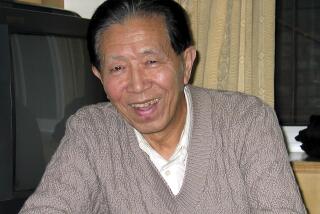A Man of Chinese History : The West learns that a key protest figure of the 1970s is alive--and still in captivity
Jonathan D. Spence, in “The Search for Modern China,” his magisterial survey of 400 years of Chinese history, is concise about even major figures. It comes as a surprise, then, that he devotes two full pages to Wei Jingsheng, a man who has been behind bars in China since 1979 and whose whereabouts have only now been learned.
“Of all the flood of words that appeared in this (Democracy Wall) period,” Spence writes, “none had more impact than those of a young man called Wei Jingsheng. Wei’s influence came partly through the force of his ideas and partly through the inspired title he chose for his Peking wall poster of December 5, 1978: ‘The Fifth Modernization.’ This was obviously a gauntlet flung in the face of the CCP (Chinese Communist Party) hierarchy--including Deng Xiaoping himself, who had declared the Four Modernizations a sufficient basis for transforming China. Wei insisted that until China embraced a fifth modernization, the other four would be ‘merely another promise.’ For Wei, the fifth modernization was democracy, the ‘holding of power by the laboring masses themselves,’ rather than by the corrupt representatives of the party state who had imposed a new ‘autocracy’ on the workers and peasants of China. ‘What is true democracy?’ asked Wei rhetorically in his poster. ‘It means the right of the people to choose their own representatives (who will) work according to their will and in their interests. Only this can be called democracy. Furthermore, the people must also have the power to replace their representatives any time so that these representatives cannot go on deceiving others in the name of the people.’ ”
During the years when the world lost track of Wei, he was rumored to have died or to have lost his mind. The best efforts of humanitarian organizations--prominent among them PEN Center USA West--to learn the truth were unavailing. But Asia Watch has now reported that Wei is being held at a labor-reform salt farm near the Bo Hai Gulf. If his sentence is not extended, he may be released next year. The friends of democracy in China hope, of course, that his voice will be heard again. But even if it is not, his claim to a place of honor in Chinese history is fully as secure as Spence suggests it is.
More to Read
Sign up for Essential California
The most important California stories and recommendations in your inbox every morning.
You may occasionally receive promotional content from the Los Angeles Times.










